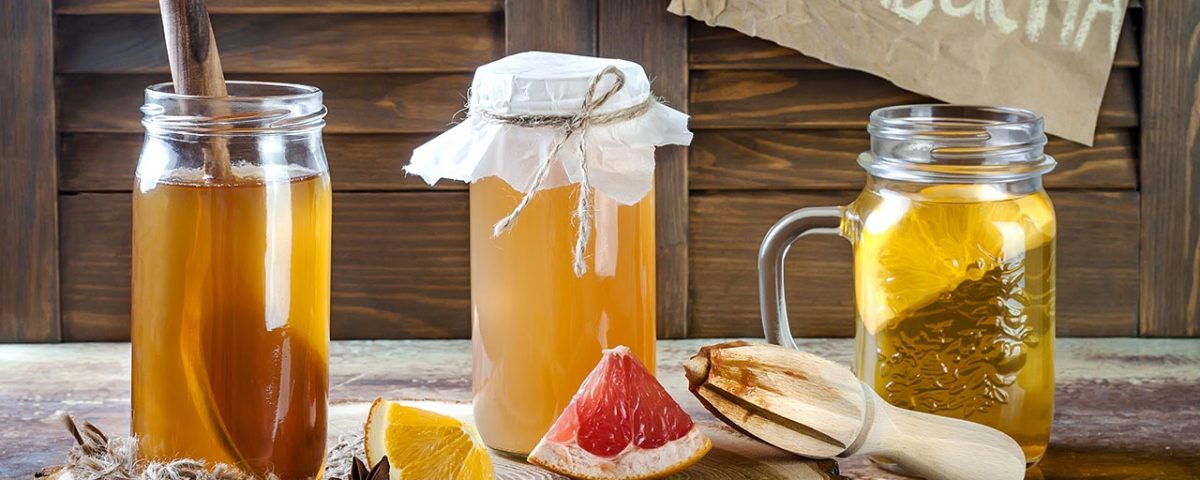You recently finished treatment at a partial hospitalization program in Chicago and are now sober.
You found a job, you are back in a healthy routine, and your life is finally back on track since you first became an alcoholic. When you meet up with a friend, they offer you some kombucha, but should you try it? At Banyan Treatment Centers Chicago, we understand that there are many obstacles on your road to long-term sobriety, and it can be hard to always know how to navigate them. While you may have gone over the biggies, like telling people you are in recovery or avoiding drug triggers, something like this is uncharted territory. Do not worry; our Chicago drug rehab is here to answer the question: Can recovering alcoholics drink kombucha?
What Is Kombucha?
Kombucha is a beverage made of sweetened black or green tea. It is fermented and slightly alcoholic. Many people drink kombucha for its various health benefits, including reduced risk of cancer, reduced risk of heart disease, and abundance of antioxidants.
Additionally, kombucha is thought to be beneficial for gut health and digestion. It has probiotics, which are good bacteria that can aid in better digestion and support a balanced microbiome in the stomach. Kombucha's antioxidant content and possibly antibacterial effects are suggested to help the immune system.
Furthermore, some people assert that taking kombucha on a daily basis might increase energy and improve mental clarity. It's crucial to remember that there hasn't been much scientific research on these particular claims, and more research is required to completely comprehend the possible advantages of kombucha.
The Dangers of Kombucha
Like any other meal or drink, kombucha should be used in moderation, and it's crucial to be aware of any potential risks or hazards. When consumed responsibly, kombucha is generally thought to be safe for most people.
However, some of the potential risks to be aware of include:
- Contamination: Harmful bacteria, fungi, or molds can get into kombucha if it isn't properly made or stored. This could happen if the brewing equipment is not properly cleaned or the fermentation process is not effectively managed. Kombucha that has been contaminated can make people sick, especially those with compromised immune systems. When creating or buying kombucha, it's essential to follow safe brewing procedures and maintain good cleanliness.
- Allergies: Even though it is uncommon, some people may have allergies to certain kombucha ingredients, such as the tea itself or the particular yeast and bacterial strains employed in the fermentation process. From minor symptoms like itching, hives, or rashes to more serious ones like difficulty breathing or anaphylaxis in severe cases, allergic reactions can manifest in a variety of ways.
- Digestive issues: While kombucha includes probiotics that some people may find helpful, it can also upset some people's stomachs. Some people, especially those who already have digestive disorders like irritable bowel syndrome (IBS) or gastritis, may experience bloating, gas, or upset stomach as a result of the carbonation and acidity of kombucha. In the event that you suffer any uncomfortable digestive symptoms, it's vital to pay attention to your body and restrict your intake.
Is Kombucha Addictive?
Traditional definitions of addiction do not apply to kombucha. It doesn't include any compounds that are addictive, like caffeine or nicotine. However, some people could grow accustomed to drinking kombucha on a regular basis because they enjoy the flavor, believe it has health benefits, or find it ritualistic to do so.
Small levels of alcohol are present in kombucha, just as in other fermented foods and drinks. Although it is normally a highly modest amount, the alcohol concentration might change depending on the fermenting process and brand. Despite the low alcohol content, it's important to remember that certain people may be more sensitive to alcohol or have dietary restrictions that forbid them from consuming any alcohol.
Even though kombucha addiction is unlikely, it's still crucial to only drink it in moderation and take a balanced approach to drinking it. As with any meal or drink, excessive consumption may have a negative impact on health. Always pay attention to your body's cues, watch what you consume, and seek medical advice if you have any worries or inquiries about your individual circumstance.
Is Kombucha Safe for Alcoholics?
Because kombucha contains such a minuscule amount of alcohol, it can sometimes fall into a gray area for recovering alcoholics. Bottled kombucha that is marked as nonalcoholic is supposed to contain less than .5 percent alcohol, and home brews are typically anywhere between .5 and 1.5 percent. Some who swear by kombucha’s great health properties are not ready to give it up. While others are not willing to risk their sobriety for a bottle of tea. Ultimately, while recovering alcoholics can drink kombucha, that does not mean they should.
For many alcoholics and professional treatment programs, complete abstinence from alcohol is a key component to a successful recovery. If you want to be safe, then kombucha should not be an exception to that rule. Kombucha for alcoholics is risky. Although it may seem like a long shot, kombucha could be a gateway back to that bad drinking habit that was so hard to give up in the first place. The alcohol content may seem low. However, as a recovering alcoholic, you could push your limits too far, thinking you’d be able to handle this amount. If you can handle kombucha, you can handle one drink… and the slippery slope begins. Why risk it? There are plenty of other teas with great health benefits that do not have any alcohol.
Whether you have recently relapsed or your loved one is taking that first step toward getting help, our alcohol Chicago addiction treatment center is designed to help you every step of the way.
If you or a loved one needs Illinois addiction treatment, do not be afraid to reach out to us. When you call 888-280-4763, we will walk you through the process and help you determine what the next best step is for you or your loved one.
Source:
Related Reading









